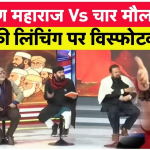
When the Manipur High Court stepped in Chief Justice MV Muralidaran had ordered the Manipur Govt to “consider inclusion of the Meitei community in the Scheduled Tribe (ST) list
19, Jan 2024 | CJP Team
It was the order given by Manipur High Court Acting Chief Justice MV Muralidaran on March 27 that had ordered the Manipur government to “consider inclusion of the Meetei/Meitei community in the Scheduled Tribe (ST) list” that has been assessed to be the trigger for the explosion of ethnic violence that had ensued between the tribal and the non-tribal communities. The said judgment had also asked the state government to send a recommendation to the Centre within four weeks on the demand for ST status to the community. When a march in protest against the said judgment was taken out by the tribal community in Churachandpur district of Manipur on May 3, the same was reportedly attacked by some from the Meitei community and widespread violence across the north-eastern state was the result.
On May 17, a bench of CJI Chandrachud and Justices PS Narasimha and JB Pardiwala had taken a grim view of the aforementioned judgment, terming the same to be “factually incorrect” as well as against the principles laid down by the Supreme Court Constitution bench judgments on the classification of communities as Scheduled Castes or Scheduled Tribes. The bench also emphasised that justice Muralidharan should have corrected his order. On October 11, the Supreme Court collegium had reiterated its recommendation to transfer Justice Muralidharan from the Manipur high court to Calcutta, saying the decision was taken for “better administration of justice”. The transfer is yet to take place.
On October 20, after a gap of 8 months, Justice Siddharth Mridul was sworn in as the Chief Justice of High Court of Manipur.
Throughout the period of violence, which is still ongoing, certain decisions have also been taken by the Manipur High Court to take control of the law and order situation. These decisions, most of involving around the issue of internet ban, destruction of property and instances of violence, are as follows:
Dealing with cases of violence, damage to property, sedition:
In addition to the Supreme Court, the High Court of Manipur was also dealing with an umbrella of cases resulting from the situation of unrest and violence in the state. From asking for affidavit from State over failure to protect burning of houses and looting, providing interim protection to those unnecessarily targeted to denying bail to the ones accused of instigating violence as well as maintaining status quo during possibility of fresh violence, the following orders were given by the Court:
Advocate Diksha Dwivedi, who had been granted interim protection from the Supreme Court along with the liberty to move the Manipur High Court, pursued relief from the High Court. On August 1, notice was issued by a single bench of Justice Guneshwar Sharma of the Manipur High Court in the writ petition that had been moved and the interim protection granted to her was continued. During a later hearing, on August 18, the same protection was further extended.
On August 3, an urgent hearing was held by the Manipur High Court at 5 am and an interim order was issued regarding maintaining the status quo ante with respect to a land where the mass burial of the bodies of the members of the Kuki-Zo community was proposed to be carried out. As observed by the bench of Justices A. Bimol Singh and A. Guneshwar Sharma, the interim order was issued since a gathering of a large mob from both the Meitei and Kuki-Zo community would take place at the mass burial ground, there was a potential of fresh violence and an aggravation of the already volatile law and order situation in the state. With this, the Court allowed the representatives of Kuki-Zo community to apply to officials for allotment of alternate site within a week and also urged the Central and State governments to try and come up with “amicable settlements” in the matter.
On August 14, the same bench as above passed an order granting the state government two weeks to file a detailed affidavit regarding the lapses on the part of the security forces about their failure to ensure the protection and safeguarding of those houses and properties during the violence in State’s Moreh town. The aforementioned order had been passed by the Court in the petition filed by Congress leader K. Devabrata Singh which sought to ‘safeguard’ houses and properties of people of Meitei, Tamil and other minor communities claiming that they have had to evacuate Moreh Town due to a bout of ethnic clash in the state.
On September 14, the Manipur High Court had refused to grant bail to three men accused of instigating fresh violence in a locality in Imphal. The said three men included T Thangzalam Haokip, a former state MLA. The said locality had consisted of mixed communities and the accused had threatened the vendors sitting in the market belonging to different ethnic groups to vacate the place immediately, which could have potentially created another volatile situation of communal clash in the state. Noting the allegations against the accused persons, the bench of Justice A. Guneshwar Sharma observed that fresh violence would have erupted in the area if the same had not been prevented by the security forces in time.
Related:
An exploration of Manipur’s incessant internet ban – a violation of fundamental freedoms
“Gross Constitutional Violations” | Supreme Court of India on Violence in Manipur









